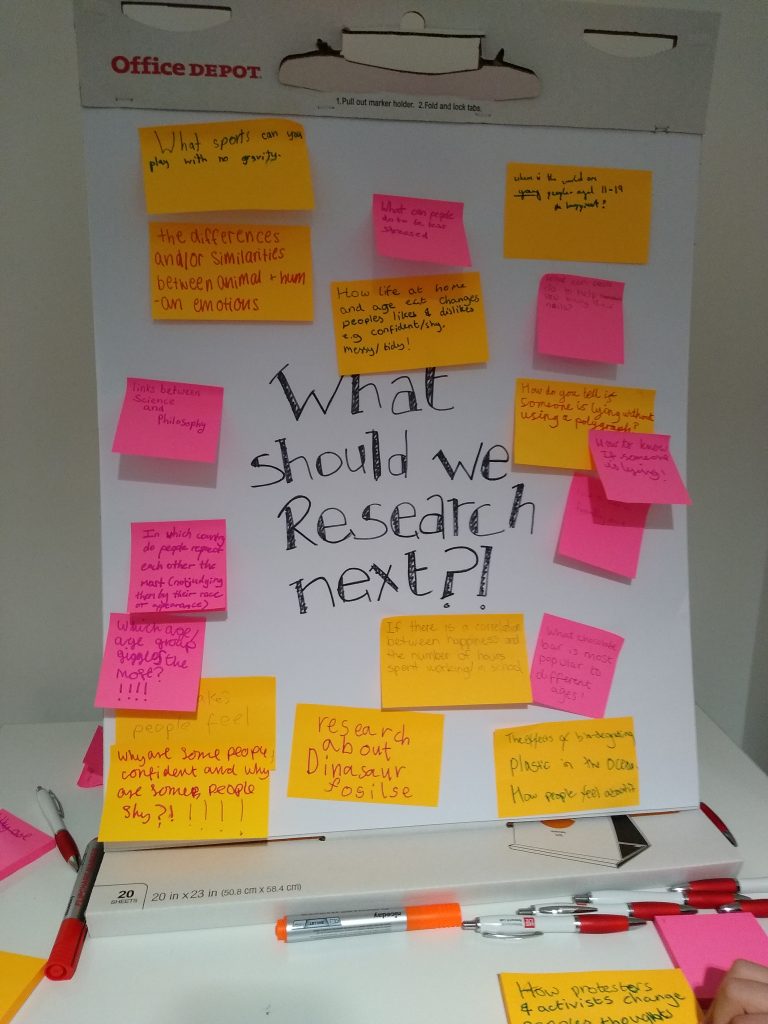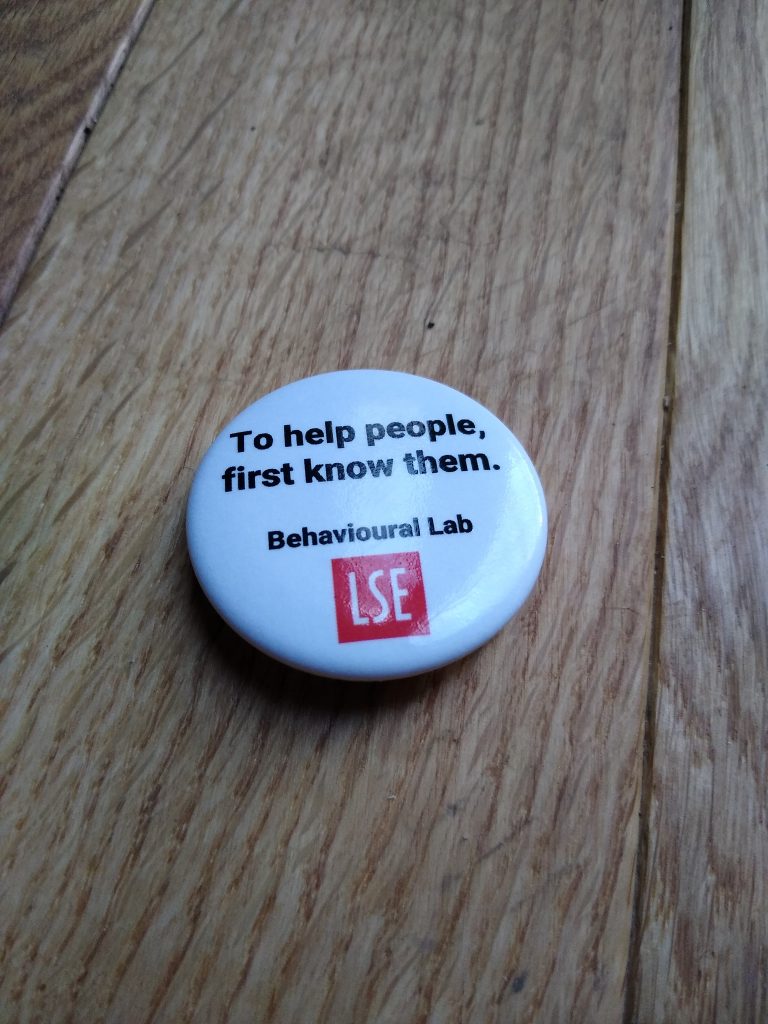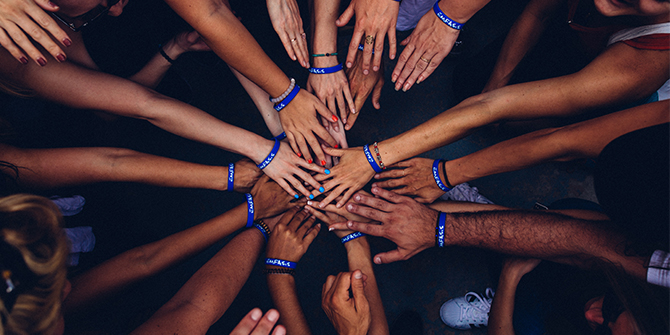‘To help people, first know them’. This was the motto on the badge that the LSE Behavioural Lab team gave out to the roughly 70 visitors we welcomed to the Researchers of the Future day on Saturday March 7 2020.
Three weeks on, at the time of this writing, the motto seems more imperative than ever, and we hope that the young researchers who visited our lab wear it with the same passion that they showed when they left the lab.
Why did families and children come to a Lab?
As part of the 2020 LSE Festival, entitled Shape the World, the Behavioural Lab asked: “How do people make decisions, like deciding whether to protest for climate change, what to spend money on, or whether to cheat on a test?“ LSE is home to a lot of research that tries to understand human behaviour and decisions like these. Some of this research is specifically about young people, so we invited children and their families to come and learn more and to have their input into what researchers should be studying and how.
And there was a lot of interest! The event was sold out and we were busy the entire afternoon. We welcomed families and their children (ranging in age from 6-18 year old), and even parents who left the children somewhere else!
What did these researchers of the future do?
The Behavioural Lab is a place where researchers from LSE and beyond study human behaviour in a controlled environment. Accompanied by a parent or guardian, each young person spent an hour or two trying a variety of different activities that showcased the work of our interdisciplinary team of behavioural researchers. We had six stations, and families could choose to stay as long as they wanted in each. We expected visitors to stay for about an hour, but we had such interest that people stayed much longer than that!
Station 1: Talking Money
The day was spearheaded by Dr. Heather Kappes, an Assistant Professor of Marketing in the Department of Management. Heather studies motivation and is interested in how adults and young people make decisions about spending money. She led the first Behavioural Lab Junior Researcher Days in 2017 and 2018 (here are the videos of those events — check them out! Junior Researcher 2017, Junior Researcher 2018).
Heather’s station included an interactive computer game about spending money that she’d used in a research project with 2000+ visitors at the Science Museum. She talked about the challenges and the fun involved in trying to study spending with a short hypothetical game.
Station 2: Social Identity Dynamics Lab
The next station was run by Dr. Ilka Gleibs, Associate Professor in the Department of Psychological and Behavioural Science. Ilka studies social identity, meaning how belonging to a group affects the way that people feel and think about themselves and how their group memberships influence their behaviour. Ilka showed how to make a mind-map of their group memberships and how they are connected. She enjoyed interacting with people aged 6-70+, discussing their maps and talking about why social psychology and behavioural science matter.
Station 3: Converging on Climate Solutions
In this station, visitors met Dr. Shakuntala Banaji, an Associate Professor and the Director of Graduate Studies in the Department of Media and Communications. Shaku has twenty years’ experience studying the role of media and technology in children and young people’s everyday lives. Her current research is on misinformation, social media and political participation, and linked to this research, she led parent-child group discussions about climate change behaviours and solutions. Shaku was able to listen to and observe how parents and children talked together, came to understandings about and made decisions relating to climate change action, which adds a new dimension to her previous research in which parents were not directly involved.
Station 4: Lab Observation Room
Here visitors met Rebecca Bianchi, the Behavioural Lab Manager. Rebecca got to show off the hidden camera equipment in the lab and discussed the possible uses for doing observations in a way that is beneficial. The young visitors found the facial expression coding software especially exciting, with each of them wanting a go at watching YouTube clips and seeing how the software was able to categorise their facial expressions.
Station 5: Decision Lab
Visitors could then go up the stairs into the newly-built 70-seat behavioural teaching lab. There, parents and children together entered the Decision Lab led by Dr. Barbara Fasolo, Head of the Lab and Associate Professor of Behavioural Science in the Department of Management, and Dr. Claire Heard, LSE Fellow in Decision Science, both at the Department of Management. Barbara and Claire are passionate about helping people make decisions that are complicated by risk, trade-offs, and too much information.
Barbara and Claire gave family members a chance to measure and then compare their decision styles, using questionnaires and games that measured risk-taking. They also took visitors’ input on future research topics, asking them: “If you had a magic wand, what decision would you like to shape right now?” There were moments of suspense as the families waited to see if they made choices in the same way as one another, and they learned about the benefits of ‘deciding together’.
Station 6: Societal Psychology Lab
On the other side of the room was Dr. Jennifer Sheehy-Skeffington, Assistant Professor of Social Psychology in the Department of Psychological and Behavioural Science. Jennifer is interested in how psychology is affected by conditions in wider society such as inequality and poverty. At the Festival event, Jennifer compared perceptions of younger and older family members of how much inequality there is in the UK, and where their family sits on the ‘ladder of society’. She then explained some of the ways that inequality and social class affect decision-making, such as in shaping perceptions of who can be trusted, and who can’t be.
To end
Visitors rested for drinks and biscuits while they left their own ideas about what researchers in the Behavioural Lab should be studying in the future. With the help of Rachel Harris (Behavioural Lab Manager), Gintare Venckute (Behavioural Lab Coordinator), and Nino Nizharadze (Head of Research Operations, Department of Management), they also completed a short survey about the day. 75% of visitors rated the event ‘Excellent’, and visitor comments included: “It was really great for my kids”, “[It was] very good, had a nice time. Hope to come again soon” and “Brilliant way to expose young people to options in science, particularly girls. It’s lovely to see so many women scientists here.”
It was a full-on day; tiring, and yet also energising and meaningful. Writing now, during the COVID-19 lockdown, that day seems all the more purposeful. We hope to make this event a regular feature, so if you’re an LSE staff member with an activity that might be relevant for young people, get in touch with the BL Team at bl@lse.ac.uk!

Thanks!
The day wouldn’t have been possible without Sean Rooney, the mastermind who keeps all the various lab computers and equipment doing what they need to do. The LSE Festival team fully supported the event and spread the word to a wide audience, for which we are very grateful.
What has happened since?
That day was the last day that the Lab facilities were open. Since then, the lab has turned virtual and we continue to support innovative scientific research that ultimately benefits behavioural outcomes. We have more than ever the opportunity to make a positive impact, as social scientists and citizens, striving to shape the world as the LSE Festival said!.
If you wish to keep in touch with us and know more about how we support behavioural research at this time, please visit our regularly updated website.
See you soon!
Behavioural Lab Junior Day Team.






